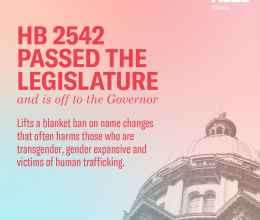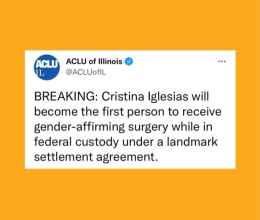
It's been close to 3 years since the exhilaration of seeing the Illinois General Assembly pass the civil union law and so very much has changed to make this country a more fair and equal place for lesbians and gay men. Even 3 years ago civil unions were not the end goal, but the Illinois legislature’s passage of that law still meant a great deal to us back then. We’d moved in Illinois from treating gays as criminals to be punished or deviants to be pitied to an understanding that lesbians and gays – like heterosexuals -- form loving committed families that our laws should recognize and protect. We couldn’t go as far as marriage, but civil unions were acceptable for the Illinois legislature at the end of 2010. But with great progress in states outside Illinois, changes in federal law and policy, and the sea change of public opinion across this country and in Illinois, it’s a lot harder to get excited about civil unions than it was 3 years ago.
| Download a FAQ about civil unions in Illinois |
 |
Since December 2010, we’ve added 8 more states where same sex couples can marry (New York in 2011, Maine and Washington in November 2012, and 2 more states with civil unions (Hawaii and Colorado). With the addition of New Jersey, we’re up to 14 marriage states plus the District of Columbia, so that 1/3 of the American population lives in a state where lesbian and gay couples can marry. We’ve also seen a massive increase in support for marriage nationally – from 44% in May 2010 to 54% in July 2013 and in Illinois where several recent polls have shown majority support for marriage for same-sex couples.
But the biggest change impacting Illinois same-sex couples came with the U.S. Supreme Court’s decision to overturn Section 3 of DOMA in the ACLU’s case for Edie Windsor. The Court’s decision that the U.S. Constitution required the federal government to provide same-sex married couples and their children the benefits and obligations of marriage abruptly ended the promise that civil unions would offer fairness to Illinois same-sex couples. Illinois’ decision to provide civil unions, but not marriage means that Illinois same-sex couples are denied the full complement of federal protections and responsibilities enjoyed by same-sex couples in states where they can marry. As the New Jersey Supreme Court recently put it regarding that New Jersey’s decision to offer same-sex couples civil unions but not marriages, “[t]he State’s statutory scheme effectively denies committed same-sex partners in New Jersey the ability to receive federal benefits now afforded to married partners.” Illinois law has the exact same result.
As a result, this civil union guide makes it clear that civil unions don’t provide equality under the law to Illinois same-sex couples. Further, it explains the advantages of leaving the state to marry, so that you can access at least some of the many important federal benefits available to same-sex married couples in a state that recognizes their marriages. And the basic message is clear – for all the promise of civil unions, it’s time for marriage here in Illinois.




